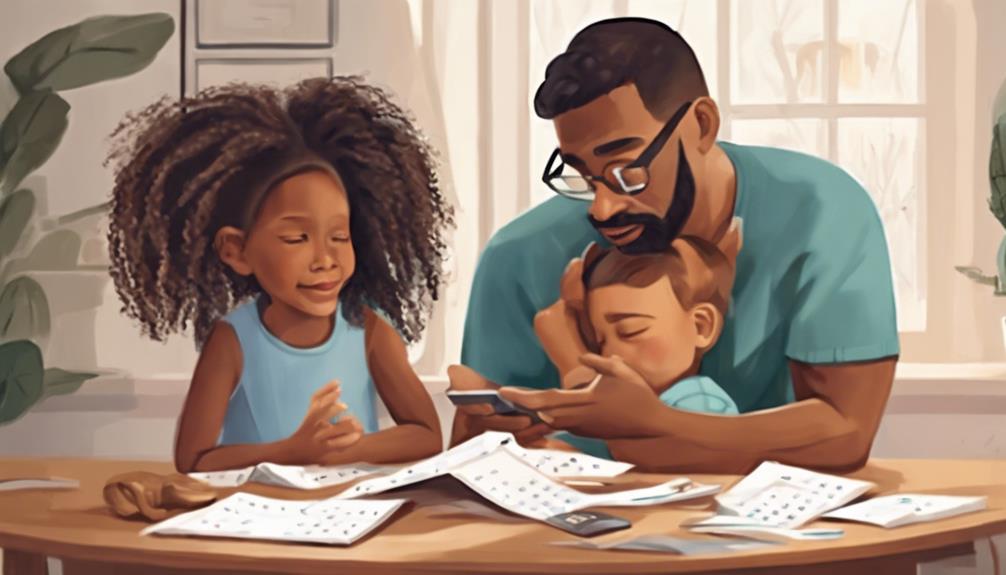Navigating the ins and outs of divorce in Virginia can be challenging, especially when it involves children. It’s crucial to grasp the legal obligations, custody agreements, and guidelines for child support. Learn all about the important aspects to handle this situation with confidence and clarity. Don’t miss out on this valuable information to successfully navigate this tough time.
However, what truly sets this step-by-step guide apart is its focus on co-parenting strategies and communication tips that foster a healthy environment for children amidst the divorce process.
By exploring the nuances of court proceedings and mediation, this guide seeks to empower parents to make informed decisions that prioritize the well-being of their children.
Discover how this comprehensive resource can offer invaluable insights and guidance throughout your journey.
Key Takeaways
- Prioritize children's best interests in custody arrangements.
- Calculate child support based on parents' income and needs.
- Establish stable parenting plans for post-divorce co-parenting.
- Utilize mediation for effective communication and child well-being.
Legal Requirements for Divorce in VA
When considering divorce in Virginia with children, meeting the state's residency requirement of residing as a domiciliary for at least six months is a crucial initial step. Virginia law mandates a 12-month separation period for couples with children before divorce proceedings can begin.
Understanding the legal requirements for child custody and visitation rights in Virginia is paramount as you navigate this challenging process. Child custody arrangements in Virginia prioritize the best interests of the child, taking into account factors such as age and the relationship with each parent.
Child support calculations are determined by considering the parents' income and the child's essential needs like housing, food, and medical expenses. Ensuring that children's rights are protected throughout the divorce proceedings is fundamental, and Virginia's legal framework aims to create custody arrangements and visitation schedules that serve the well-being of the children involved.
Custody Arrangements and Parenting Plans

Navigating divorce in Virginia with children involves establishing custody arrangements and parenting plans that prioritize the well-being of the child. This includes outlining responsibilities and guidelines for co-parenting post-divorce. In Virginia, custody arrangements offer options such as sole custody, joint legal custody, and joint physical custody. These arrangements are crafted based on various factors, including the child's age, educational needs, and their relationship with each parent. Whether determined through mutual agreement or a court order, the goal remains focused on the child's best interests.
Parenting plans play a vital role in solidifying child custody schedules, decision-making responsibilities, and communication guidelines between co-parents. Through these plans, clear expectations are set to foster a healthy co-parenting dynamic post-divorce. By considering the unique circumstances of the child and the family, custody arrangements and parenting plans aim to provide stability and support for the child during this challenging time.
Child Support Guidelines and Calculations
Child support guidelines in Virginia play a crucial role in ensuring the well-being and development of the child post-divorce by calculating support based on parents' income and the child's needs, including factors like housing, food, medical expenses, and childcare costs. Understanding these guidelines and calculations is vital for both parents involved in a divorce with children in Virginia.
- Formula-Based Calculation: Child support in Virginia follows a specific formula that takes into account both parents' incomes to determine the appropriate support amount.
- Adjustments for Expenses: The court considers various expenses such as housing, food, medical needs, and childcare costs when calculating child support to ensure the child's needs are met adequately.
- Financial Situation Changes: Child support amounts can be adjusted based on changes in financial situations, ensuring that the child's requirements are continuously supported even if circumstances evolve.
Co-Parenting Strategies and Communication Tips

Establishing effective co-parenting strategies and fostering open communication are essential components in ensuring a harmonious and child-focused post-divorce environment. When navigating co-parenting, it is crucial to prioritize the child's needs and maintain a child-focused approach in all interactions. Utilizing technology tools such as shared calendars or co-parenting apps can streamline scheduling and information sharing, making coordination easier. Active listening and respectful communication are key in resolving conflicts and making joint decisions effectively. If communication challenges persist, seeking the guidance of a family therapist or mediator can help improve dynamics and strengthen co-parenting relationships. By creating a structured communication plan and embracing a child-centered mindset, co-parents can cultivate a supportive environment for their children to thrive in the face of divorce.
| Co-Parenting Strategies | Communication Tips |
|---|---|
| Prioritize child's needs | Practice active listening |
| Utilize technology tools | Maintain respectful communication |
| Seek guidance if needed | Embrace child-focused approach |
Navigating Court Proceedings and Mediation
When facing divorce in Virginia with children, the legal process often involves navigating court proceedings and engaging in mediation to address child custody and visitation matters. Virginia courts require filing paperwork, attending hearings, and presenting evidence related to child custody. Mediation, a common method in Virginia divorce cases, aims to help parents reach agreements on child-related issues outside of court.
Here are some key points to consider:
- Mediation Order: Courts may order mediation to facilitate discussions and negotiations between parents regarding child custody arrangements.
- Cost-Effective Resolution: Mediation is a cost-effective and efficient way to resolve disputes, focusing on the child's best interests and creating a parenting plan.
- Mediator Assistance: Mediators in Virginia assist parents in effective communication, exploring options, and working towards mutually acceptable solutions for child custody and visitation.
Navigating court proceedings and mediation can be emotionally challenging, but focusing on the child's well-being and seeking the guidance of mediators can help parents protect their parental rights and ensure the child's best interests are prioritized during the divorce process.
Frequently Asked Questions
At What Age Can a Child Choose Which Parent to Live With in Virginia?
We understand the concern about when a child can choose which parent to live with in Virginia. While there's no set age, the court considers the child's best interests, including their wishes, maturity, and reasoning.
Can a Wife Leave With Child in Virginia?
Yes, we can leave with the child in Virginia if there's no custody order. It's crucial to understand potential consequences and seek legal advice. Establishing a formal custody arrangement is best to protect the child's interests.
What Are the Steps to Separation in Virginia?
We start by living separately for a year, a mandatory step for divorce in Virginia when children are involved. Establishing the separation date is vital. Crafting a detailed separation agreement during this time is wise for property, spousal, and child matters.
How Can I Prepare a Separation Agreement When Navigating Divorce in VA With Children?
When navigating divorce in VA with children, it’s crucial to seek guidance from experienced queens divorce lawyers separation agreements. These legal professionals can help you prepare a comprehensive separation agreement that addresses important issues such as child custody, visitation, and support, ensuring a smoother transition for all parties involved.
Conclusion
As we navigate the complexities of divorce in Virginia with children, it's crucial to prioritize their well-being.
Did you know that children of divorced parents are more likely to experience emotional distress if the divorce is high-conflict?
By focusing on effective communication, cooperation, and putting the needs of our children first, we can create a more positive and stable environment for them during this challenging time.
Let's work together to ensure their future is bright.










